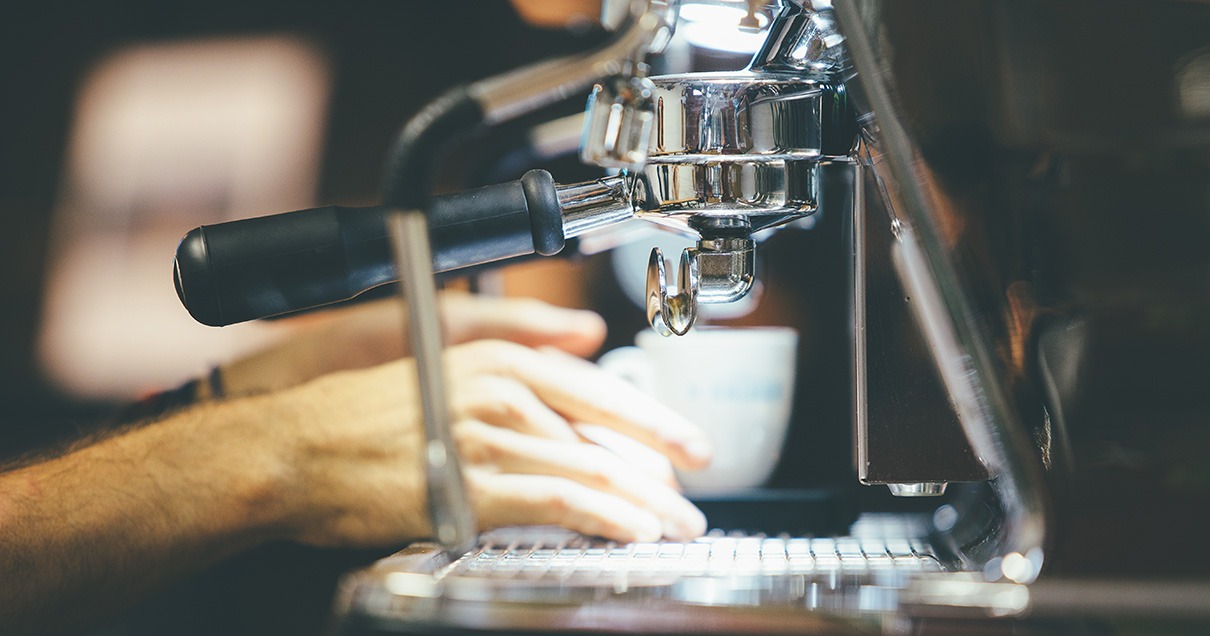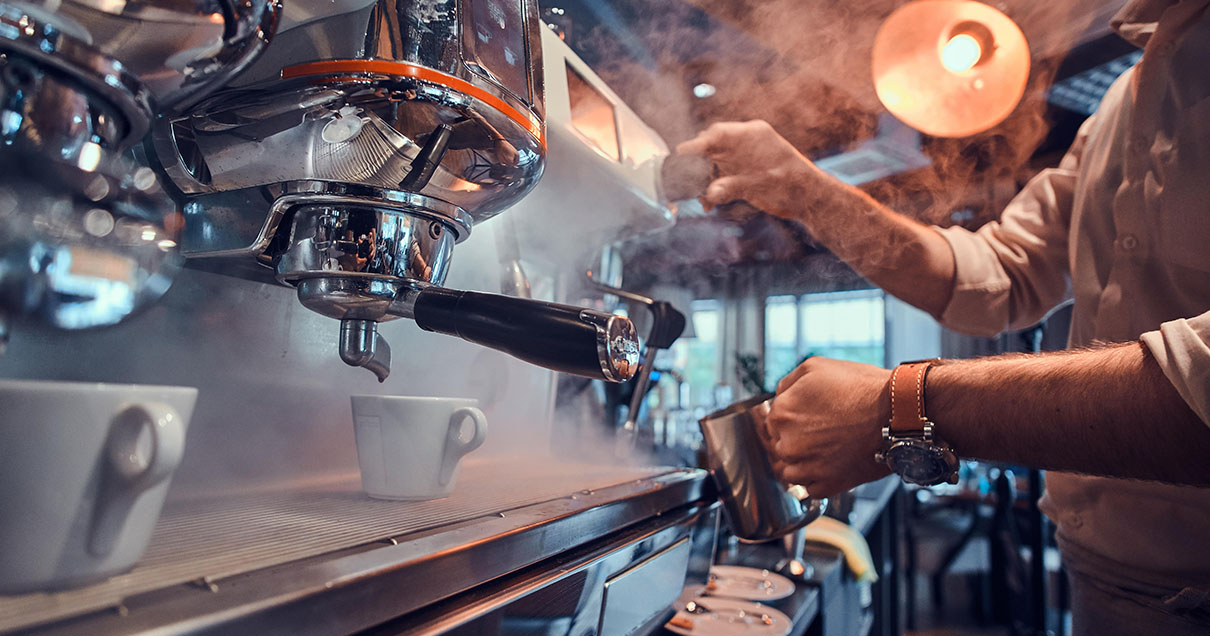A guide to water filters for espresso machines.
Choosing professional water filters for coffee machines requires some time and knowledge. To deliver a satisfying ‘cup of joe’, there are some details about water filters for espresso machines that need to be considered.
Water serves as a medium for coffee flavour. Depending on its composition, water can enhance coffee aroma or blunt it. A water filter can alter the water characteristics making it perfect for coffee brewing. As easy as it sounds, the choice of a proper water filter for a coffee machine can be a bit tricky. Hence, we have prepared a guide on water filters suitable for brewing coffee. We hope you will find it useful, informative and beneficial for your coffee shop, bistro or restaurant.
Read on 🙂
How does water affect the coffee taste?
Three main elements influence the taste of water. Some of them can spoil it if present in large amounts, others should be eliminated.
Carbonate hardness
Coffee taste depends strongly on water alkalinity and the sum of all minerals in it. Water alkalinity, also known as carbonate hardness, consists of hydrogen carbonate, calcium and magnesium minerals.
Carbonate hardness (alkalinity) directly influences coffee flavour. If it is too high, it neutralizes caffeic acids, which are crucial for coffee taste and aroma. As a result, the coffee brewed with hard water will be flat and unpalatable. If the water alkalinity is minimal, it also lacks calcium and magnesium minerals, which spice up the coffee flavour.
However, so-called soft water has an optimal level of alkalinity and minerals, preferred by the consumers, and is also better for brewing, as it delivers coffee with a fully developed aroma and pleasant, lasting taste.
Added substances
Water must be treated to be safe and consumption-ready. Before the water reaches your facility, it is conditioned with some chemicals to sanitize it and remove turbidity.
Chlorine, a common water disinfectant, can give an unpleasant odour and taste to the water, especially when combined with organic debris. If the water smells and tastes like chlorine, it will transfer to coffee as well, giving it an unpleasant aftertaste and dull fragrance.
Organic matter
Water is carefully inspected against any organic matter present in it. But even if strictly controlled, it still can be perceptible in the water, affecting the coffee taste and changing the coffee aroma profile.
Keeping up the brewing standards for water requires some effort, as it is a nuanced science. Luckily, the best water composition for coffee making has already been deciphered. It can be obtained and maintained by installing an effective water filter.
What a good water filter for a coffee machine should do?
A well-matched water filtering system for a professional coffee maker should eliminate or neutralize the substances and chemical compounds responsible for bad water taste and odour.
The choice of a water filter should be based on the chemical composition of the water at your premises. If you need to address more than one issue, a set of various water filters might be recommended.
Active carbon removes chlorine
If your water has a strong chlorine smell and taste, a carbon block filter is a must. Usually, a carbon block cartridge is installed as a pre-filter. It prepares the water for the next steps of filtration if needed. If chlorine aftertaste and unpleasant smell are your only problems with water, using active carbon will solve them.
The sediment filter removes dust, silt and sand
Is your water full of mechanical impurities? Or have you noticed it has a grey, dusty colour? Install a sediment filter. It will effectively cleanse water from any suspended solids. Use it as a pre-filter or at the final filtration stage to get rid of any dust that might collect e. g. after using an activated carbon filter. A sediment filter will ‘polish’ and refine the water, making it ready for drinking.
Softening medium reduces water hardness
To effectively adjust the carbonate hardness level, a water filter with softening medium should be used, e. g. an ion exchange resin or Bluesoft+. Because water hardness can differ depending on the source and place, some innovative filter sets allow for mixing softened water with raw one to balance out the mineral content in the water.
Ultrafiltration saves flavour minerals
Ultrafiltration works best for slightly or moderately polluted water. It removes particulates and macromolecules up to 0.1 μm but keeps the flavour minerals, calcium and magnesium. Unlike reverse osmosis, ultrafiltration reduces pollution in the flow. It also does not throw raw water back into the sewage, making this filtration system sustainable and cost-effective.
Single-cartridge water filters can be effective only if the water you use is of good quality. Usually, water used for coffee machines needs treating on many levels. Therefore, it should pass through several filters to be ready for brewing. And at this moment you will probably ask yourself a question…
What is the best water filter for an espresso machine?
To properly treat water for coffee making, the best solution would be a multi-stage filter, with cartridges arranged in a specific order to deliver water with the best brewing parameters.
Here, at Bluefilters, we have developed five water filtering sets specifically for coffee machines. Each set includes at least two of the following filters:
- activated carbon filter – to eliminate bad taste and odour
- water softening filter – to reduce water hardness
- ultrafiltration filter – to get rid of macromolecules
- sediment filter – to remove silt, sand and other suspended matter
If your main problem is hard water, try out these filters:
AMERICANO – a heavy-duty, 6-stage water filter that battles chlorine aftertaste and softens the water.
CAPPUCINO – a 3-stage water filter for moderately polluted water, that reduces chlorine content and water hardness.
If your water needs softening, but also cleaning and taste improvement, we recommend these full-treatment filters:
FRAPPE – 4 filtering cartridges, including activated carbon for improving water taste, softening medium and an additional ultrafiltration cartridge.
MACCHIATO – to refine your slightly polluted water, a set of 3 filters will do: a carbon block, a softening medium and ultrafiltration.
MOCHA – 4 water filtration cartridges to reduce both bad water taste and carbonate hardness and sift away unwanted sediments.
What about reverse osmosis – is it good for coffee brewing?
Reverse osmosis is a huge trend when it comes to drinking water filtration. It is the most thorough way of treating water, as it removes most pollutants and hard minerals. It seems like the RO treated water would be the best one for coffee brewing.
However, due to the extremely detailed filtration, water treated with RO lacks essential flavour minerals. Mineral-free water will over-extract coffee, making it taste flat and bitter.
To bring the mineral content back to the water, a remineralization cartridge should be used as the final stage of water filtration. The mineralization usually works efficiently and guarantees the full aroma of coffee.
Choosing the right water filter for your espresso machine requires some water knowledge. You need to test the water at your premises first, to learn about its composition. You should also assess the mineral content you need to deliver the perfect brew. With this information, you can pick an ideal water filter to match your expectations and needs.
For more information on the best water characteristic for coffee making, you will find here: Good water for HoReCa – why is it essential?

